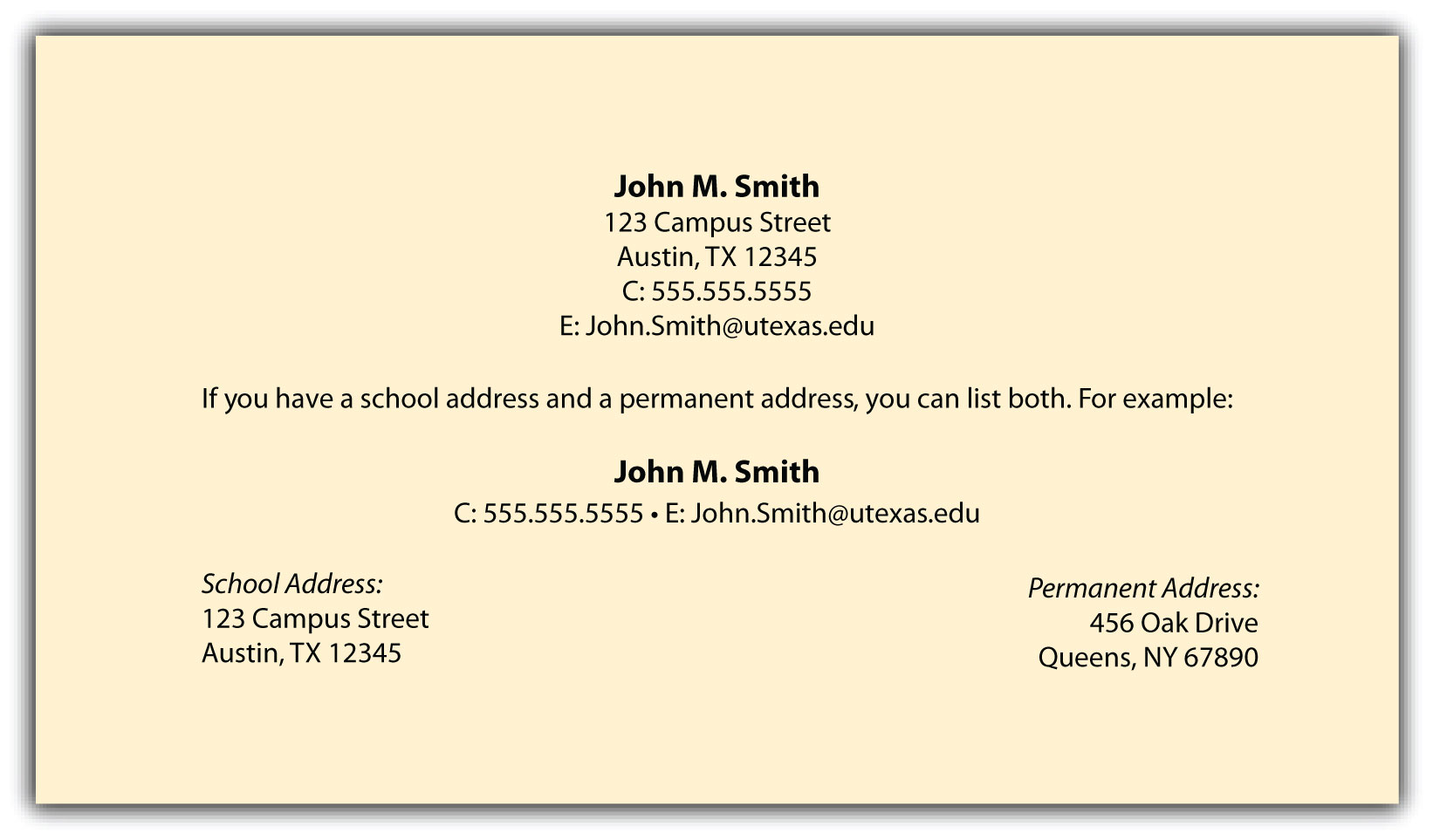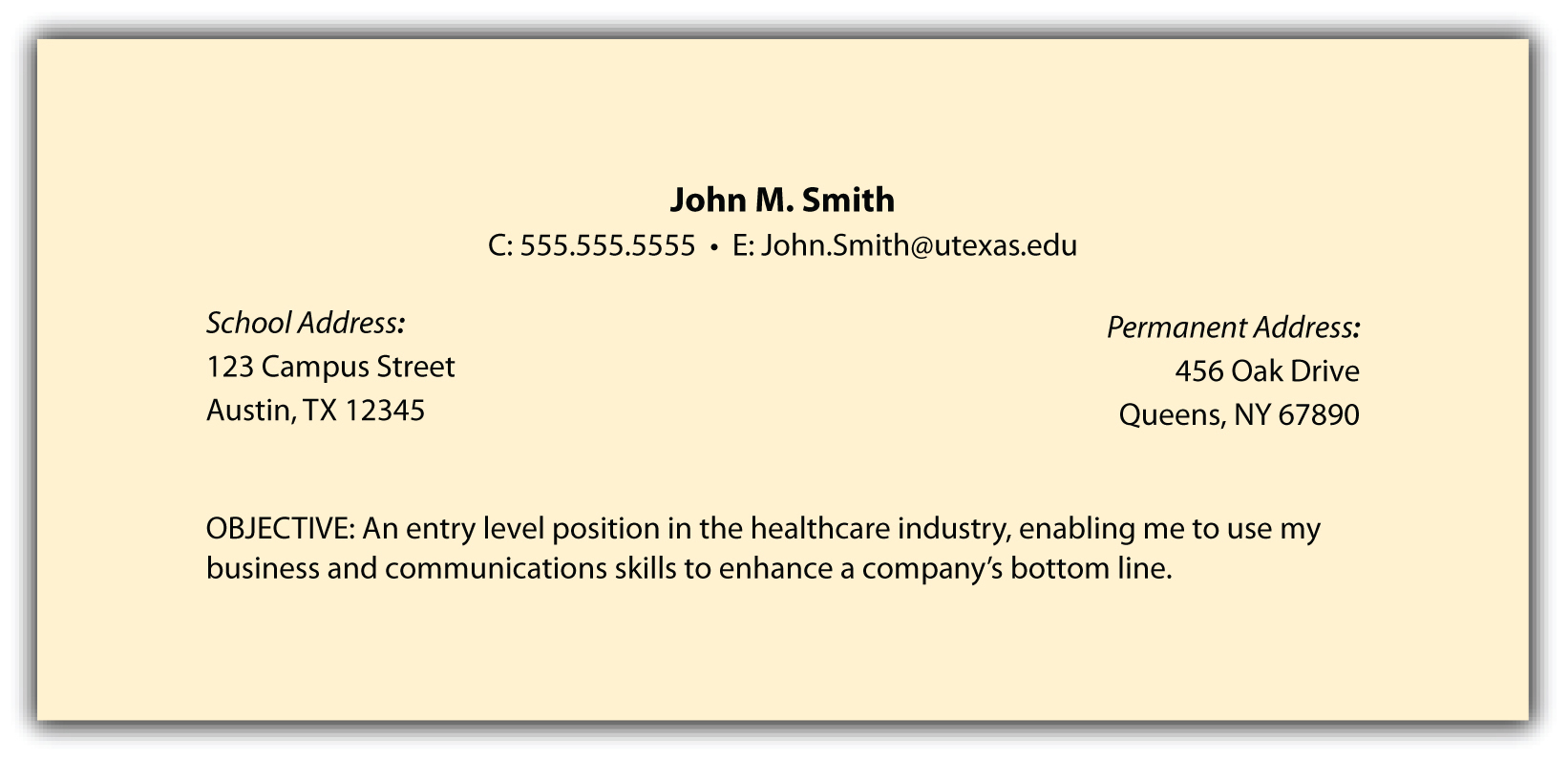This is “Header and Objective”, section 4.2 from the book Job Searching in Six Steps (v. 1.0). For details on it (including licensing), click here.
For more information on the source of this book, or why it is available for free, please see the project's home page. You can browse or download additional books there. To download a .zip file containing this book to use offline, simply click here.
4.2 Header and Objective
Learning Objectives
- Make certain that your header is professional and gives your prospective employers a positive first impression.
- Learn the importance of clarity when writing an objective.
Header
Your résumé header should include four items:
- Your full name
- Your address
- Your e-mail address
- Your phone number
Your Full Name
Include your full name. If your first name is difficult to pronounce, you could include your nickname in quotation marks or parentheses (e.g., Xioang “Angie” Kim or Massimo “Mass” Rapini). Names are typically bolded and centered on the page, but aligning your name to the right or left is also appropriate.
Your Address
You can use your school address or your permanent home address, or both. Most recruiters prefer both because, at times, they may need to send information to both addresses at different times of the year. Clarity is always a very good thing.

Your E-mail Address
Have a professional e-mail address because employers frown upon unprofessional addresses such as greeneyes2@gmail.com or runningguy62@verizon.net. It’s best to use your first name and your last name in a simple e-mail format.
Establish a professional e-mail address as soon as possible (e.g., c.thompson@gmail.com or e.autoris@verizon.net). It’s much more relevant than c.thompson@rutgers.edu, especially if you graduated six months earlier. If you continue your job search after graduation, you might not be permitted to use your school e-mail address, nor should you once you have graduated. Given this, obtaining a professional e-mail address is a good networking opportunity to contact the individuals with whom you’ve been in touch regarding your job search. Inform those individuals and any relevant recruiters that you’ve updated your contact information.
Your Phone Number
Include only one phone number on your résumé and record a professional voice mail. Do not play music on your voice mail. and speak clearly and succinctly. It’s also recommended that you not answer your cell phone if you are in a loud area, especially when you do not recognize the number. Allow the call to go to voice mail, listen to it in a quiet place, and return the call as soon as possible. It very well could be a recruiter who would not be impressed by you shouting, “What? I can’t hear you!” A professional voice mail might sound like the following: “You’ve reached John Smith at 555.555.5555. Please leave a message and I will call you back as soon as possible.”
Include your name and repeat the phone number to help the recruiter know for certain that the proper person has been reached. Clarity is always helpful and appreciated. Lastly, be sure to check your voice mail on a regular basis, even if you are on vacation.
Objective
Recruiters appreciate clarity, and an objective can help a recruiter understand exactly what you offer or what business would best suit your background. Objectives can be very targeted and mention a specific position or can be a bit broader in describing a job function. Whatever objective you choose, it should state what you are looking for and what you have to contribute. It’s not only about you. It’s about what you can do for them. Here are some examples of effective objectives:
- An entry-level accounting position in audit, allowing me to use my analytical and detail orientation to ensure accuracy in all reports and reviews.
- A communications internship at a top media company that will allow me to use my knowledge and experience to produce and edit clear and effective communications.
- An entry-level position in the health-care industry, enabling me to use my business and communications skills to enhance a company’s bottom line.
- A full-time marketing position at a Fortune 500 company, enabling me to utilize my knowledge and experience to enhance marketing efforts firm-wide.
Your objective should not ramble past two lines because no recruiter appreciates reading a paragraph-sized objective.
Using the four preceding items, Figure 4.2 "Sample Résumé—Header and Objective" illustrates how our sample résumé looks thus far.
Figure 4.2 Sample Résumé—Header and Objective

Key Takeaways
- A header is the first thing a recruiter sees on your résumé. This information should make a strong and professional impression of your candidacy.
- A professional voice mail recording is critical to being considered for a position.
- An objective should be clear and succinct, allowing the reader to understand what type of position you are looking for.
Exercises
- Draft the header to your résumé, including all core components.
- Create professional voice mails for your cell phone and your home phone if they will be used for your job search.
- Create a professional e-mail address separate from your school e-mail address, unless you already have one. This is especially important when you enter your senior year.
- Draft two objectives: one that references a specific job and another that references an entry-level position in a certain industry.




